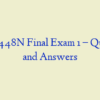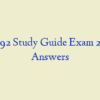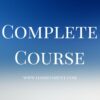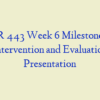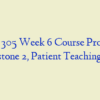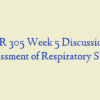Description
NR 226 Final Exam Study Outline (62 Pages with all Answers)
The Nursing Process
- 5 Steps of the Nursing Process (ADPIE)
- Assessment
- Phases of interview/assessment
- Methods of obtaining data
- Subjective Data
- Objective Data
- Diagnosis
- Identify components of the nursing diagnostic statement
- Identify assessment findings, goals, interventions, evaluations appropriate to a specific nursing diagnosis.
- Planning
- Components of goal/outcome statement
- Implementation
- Independent nursing interventions
- Dependent nursing interventions
- Direct care activities
- Indirect care activities
- Evaluation
- Elements of the evaluation process
- Assessment
- Professional Practice
- Delegation
- 5 rights
- Delegation
- Right task – ones that are repetitive and require little supervision, relatively noninvasive, results that are predictable, minimal risk (ex: specimen collection, ambulating stable pts, prepping room for pt. admit)
- Right Circumstances – patient setting, available resources
- Right person – make sure that the tasks match the person’s level of expertise
- Right Direction / Communication – give clear, concise descriptions of the task including its objective, limits, and expectations
- Right Supervision/ Evaluation – provide appropriate monitoring, evaluation, intervention when needed, and feedback
- supervision
- Prioritization of care – organization of vison of desired outcomes for a patient\
- Nursing care delivery model
- Management of patient care
- Leadership
- Ethics
- Code of Ethics
- Understand, give examples of terms
- Guidelines for ethical decision making
- Legal issues in nursing
- Nurse Practice Acts
- Regulatory law,
- Standards of care
- The American Nurses Association
- Nursing standards of care
- Errors
- ADA
- EMTALA (Emergency Medical Treatment and Active Labor Act)
- Living will
- Durable power of attorney
- Health care surrogate
- Organ donation
- Minor child
- Consent
- Use of restraints
- Older Adult
- Expected physical changes
- Expected Cognitive Changes
- Goals for care of cognitively impaired older adults
- Nursing Process
Pain
- Assessment of pain:
- Patient’s expression of pain
- Characteristics of pain
- Onset and duration
- Location
- Intensity
- Quality
- Pattern
- Relief measures
- Contributing symptoms
- Effects of pain on the patient
- Factors affecting/influencing pain perception
- Physiological
- Social
- Psychological
- Pain tolerance
- Cultural
- Pain scales
- Cultural considerations
- Implications for Patient-Centered Care
- Tolerance & Addiction
- Goals for pain management
- Patient teaching regarding pain management
- Implementation
- Health Promotion
- Maintaining Wellness
- Non-pharmacologic interventions
- Nonpharmacological pain relief interventions
- Evaluation of effectiveness of interventions
- Behavioral Indicators of Effects of Pain
- Vocalizations
- Facial Expressions
- Body Movement
- Social Interaction
Grief
- Criteria for hospice care, palliative care (pg. 761)
- Post mortem care, when autopsy required (pg. 765)
- Cultural considerations for death, dying, post-mortem care (pg.767, 755)
- Kubler-Ross stages of dying (DABDA pg. 753)
- Factors influencing loss and grief (pg.753-756)
- Communication/care of patient and significant others (761-763)
- Nursing diagnoses related to grief/death & dying (pg. 757)
- Steps for Care of the Body after Death (Box 37-11)
Sleep
- Functions/ Purposes of sleep
- Factors that affect sleep
- Factors that promote sleep/Sleep hygiene
- Nursing diagnoses related to sleep
- Sleep disorders & related assessment and nursing care
- Insomnia
- Sleep Apnea
- Narcolepsy
- Conducting Sleep assessment/ Sleep history
- Tools for Sleep Assessment.
- Sleep History.
- Description of Sleeping Problems.
- Sleep requirements based on developmental stage
- Symptoms that occur with lack of sleep
Bowel Elimination
- Assessment of bowel function
- Causes of diarrhea, constipation
- Nursing diagnoses related to bowel elimination
- Interventions to promote bowel elimination
- Ostomy assessments, care, teaching
- Hemoccult testing
- Enema administration
- Bowel training program
Fluid & Electrolytes, Acid/Base
Perioperative Nursing
- Preoperative phase
- Factors that can increase risk for complications in surgery
- Procedures pre-op
- Intraoperative phase
- Role of the nurse
- Postoperative phase
- Prevention of post-op complications
- Diet progression post-op
- Teaching for each phase
- Pre-Op
- Intra-Op
- Post-Op
Med Calc – to include simple drop rates
- Conversion within metric (grams-milligrams-micrograms)

